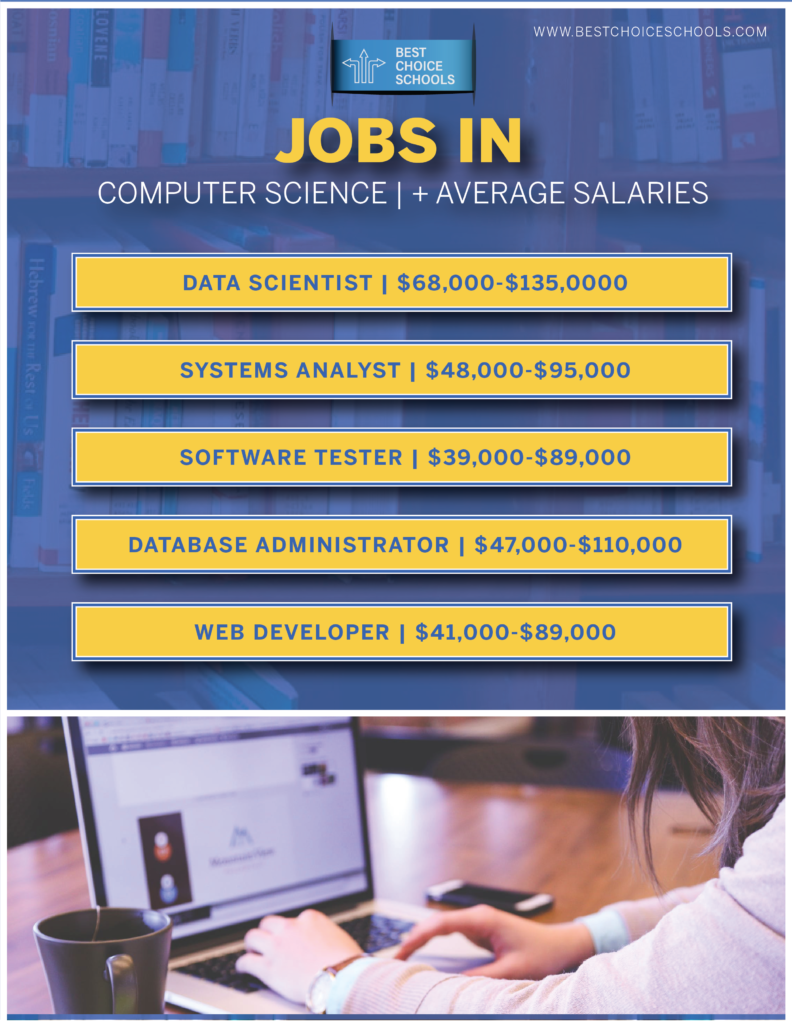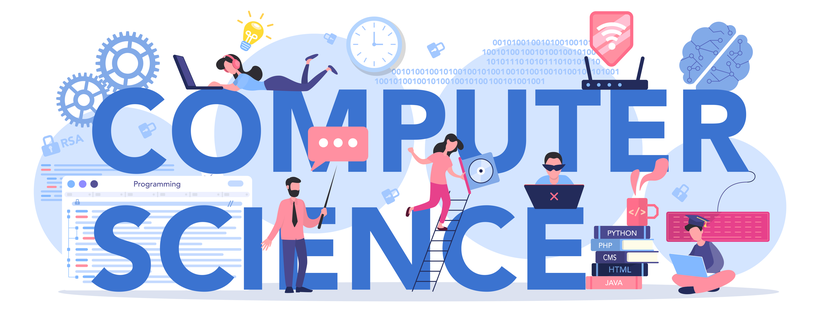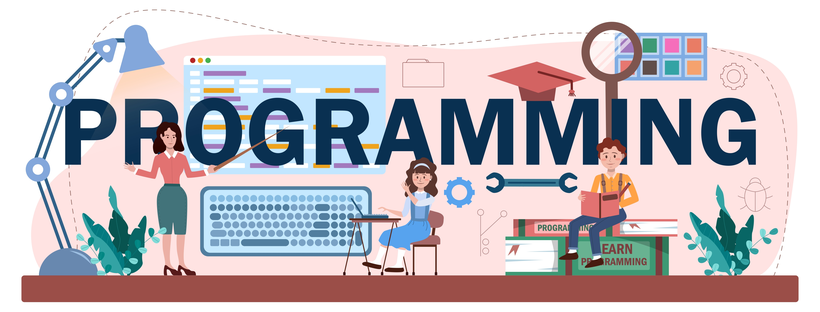
Computer Science and Computer Programming are currently some of the most popular programs of study at major universities and colleges worldwide. Demand for people who know a lot about computers is only accelerating as our technology and knowledge around it increase. In this article, we’ll explore the differences between computer science and computer programming.
People who can code, program, and repair computers are some of the most highly sought-after employees in the current job market. Thus, those with computer-related degrees can make some of the highest salaries coming out of college. In fact, many people who work in the tech industry make over six figures straight out of college, so it is understandable why interest in these degrees has been growing in recent years.
But, what are the differences between Computer Science and Computer Programming degrees, and which one should you pursue? While these two fields might sound very similar, in reality, there are a lot of differences between Computer Science and Computer Programming.
These programs could significantly impact the career you eventually have, so it’s essential to understand how they differ before you choose your major. In this article, we will be discussing the differences between Computer Science and Computer Programming, the kind of coursework you will take, and the types of jobs you could land after completing your degree.
What Is Computer Science?
Computer Science can essentially be thought of as the theoretical side of computers. Rather than actually coding, programming, and creating running programs, you deal with the theories and problems that a computer programmer will eventually sort out. Computer Science is the study of the processes that sort through and organize the data within computers.
Computer science is incredibly relevant in everyday life. It comprises a more general understanding of how computers work and the processes that make them function as we are familiar with them.
You may also like: Top 30 Schools for an Online Computer Science Degree
During a Computer Science degree program, you will take a variety of different courses. To begin, you will likely take some general education courses in things like math, sciences, and humanities. You may even have a foreign language requirement. A bachelor’s degree in Computer Science is usually enough education for anyone to get started in the technology field successfully, and there are many different jobs you could get with this type of degree.
Computer Science majors will typically take college courses in topics like Artificial Intelligence, Computer Theory, Algorithms, Calculus, Computer Architecture, and more. But, as you can see, these courses typically don’t do a deep-dive into any programming languages or coding like a Computer Programming major would.
While most Computer Science majors eventually work in the technology sector, there are jobs available for Computer Scientists in government, healthcare, communications, hospitality, and virtually any industry you can think of. Computers are everywhere in our modern world, and almost no business can exist without them, and therefore, computer scientists.
Some of the most common careers for Computer Science majors include data scientist, computer scientist, web developer, or security analyst.
What Is Computer Programming?
Computer Programming is essentially the physical, data-oriented structures implemented by the theories explored in Computer Science. Computer Programming teaches students how to design, code, and implement specific programs that execute tasks within a computer.
The programs can vary greatly in their structures, goals, and execution, but programmers will learn how to create a variety of different ones. In addition, programming courses teach students to find and write the correct sequence of instructions to perform the desired task. Computer Programming courses will also introduce students to various programming languages, including C++, Python, Java, HTML, and more.
Computer Programming is more hands-on than Computer Science. You will learn more of the technical elements about how computers process data and how code is interpreted within the CPU. Computer Programming is simply an application of Computer Science, but many computer scientists cannot code or write programs. Additionally, you can be an incredibly skilled programmer without knowledge of the fundamentals of Computer Science. During your Computer Programming degree, you will take courses in the foundations of programming languages, computer applications, software development, and more.
As we mentioned earlier, computers are a vital resource for virtually any modern business or facet of life. Therefore, everyone needs employees to program their computers, write code for websites, or help them with debugging programs they already use. As a result, most Computer Programming majors end up in roles that primarily consist of programming. Whether you become a programmer, software engineer, app developer, or some other programming facet, you will likely spend most of your days writing new programs or building upon existing ones.
How Do the Two Degrees Differ?
As previously mentioned, Computer Science deals primarily with theory and the fundamental aspects of how computers function. On the other hand, Computer Programming applies those concepts in a more practical way, using data and computer languages. Many different problems arise during the writing and running of programs in Computer Programming, and Computer Science aims to deal with, analyze, and eventually solve all of those issues. This is the primary difference between the two programs of study: one of them is more theoretical and fundamental, while the other is much more practical and deals with data.
Another way that Computer Science and Computer Programming are different is the kind of cutting-edge issues they tackle in the computer industry as a whole.
While Computer Science-oriented people usually tackle new-age computer issues and topics like artificial intelligence or deep fakes, programmers might write the code to make these programs run smoothly and debug the code when it goes awry.
You could undertake a variety of different jobs with either a Computer Science or a Computer Programming degree. Still, there are some preferences you should consider when choosing between one or the other. For example, if you enjoy numbers, math, and more practical computer issues, you should definitely opt for a Computer Programming degree. On the other hand, if you like to think about or work with computers more theoretically, consider pursuing a Computer Science degree.
Related: 10 Online Computer Science Degree Specializations
Is There an Average Salary Difference?
The salary difference between a computer programmer and a computer scientist depends primarily on the kind of job you decide to take out of college. Many tech jobs are well above the six-figure salary range, but your paycheck can depend significantly on whether you’re working for a Fortune 500, a small start-up, or even freelancing on your own.
According to PayScale, the average salary for someone who has graduated with a bachelor’s degree in Computer Science is around $91,000 a year. This is quite a handsome salary on its own, but this number can go up significantly if you decide to pursue a job such as a senior software engineer or a software analyst.
Conversely, the average salary for someone who has graduated with a bachelor’s degree in Computer Programming hovers around $75,000 a year. However, taking higher-level positions or working your way up to the top of the software engineering or design team will alter this number significantly.
What Do Computer Scientists Do?
Computer scientists could take on a variety of jobs, including:
Data scientist: Data scientists essentially wrangle big groups of data. A data scientist will use different processes, algorithms, and scientific methods to extract knowledge and conclusions from data sets. Where data is messy and unstructured, a data scientist is waiting in the wings to decode it and advise a business or company on what the information means, what they should do with it, and how to proceed further.
Systems analyst: As you might imagine, a systems analyst is someone who works to design and implement information systems within a company or organization. A systems analyst will often work with the management of a business or organization to create their management information system, which usually oversees the general functions of a company.
Software tester: Software testers are highly involved in the quality assurance portion of software creation. As their title would suggest, they conduct both automated and manual software testing to ensure that it is working properly before it goes to consumers. Software testing also helps shareholders to understand the quality or timeline of the software they have invested in.
Database administrator: Database administrators or DBAs report to data analysts, ensuring they have the tools they need to find the correct information for their systems. DBAs monitor the operation of databases to confirm that they are moving smoothly and up-to-code. DBAs will also report to the company they work for, changing or reorganizing a database according to management’s needs.
Web developer: While this role is primarily more suited to a computer programmer, understanding computer science can be a fundamental aspect of web development. A web developer writes code for and programs web applications, specifically using a client-server model.
Jobs in Computer Science and Their Average Salaries

What Do Computer Programmers Do?
Computer programmers could have a few different career paths, including:
Front-end developer: A front-end developer is a more specific type of web developer who tackles the design and coding part of a website that people actually see, which is known as the “front-end.” The goal for front-end developers is to make a web page functional and aesthetically pleasing to clients and visitors. The languages that front-end developers will most often use to code are HTML, CSS, and JavaScript.
Back-end developer: Similar to a front-end developer, a back-end developer is a web developer focused on designing and coding the parts of a website that a user cannot see, known as the “back-end.” Back-end developers focus on the actual goals of a website and use things like development languages, databases, servers, and API to achieve those goals. Many back-end developers will use languages like Python to code.
Software engineer: A software developer is essentially a computer programmer or coder who specifically designs computer software. These specialists can either code one specific type of software or work across the board with many different styles.
UX/UI designer: UX (user experience) and UI (user interface) design are focused on solving user problems with the goal of creating interfaces that are not only functional but also aesthetically pleasing and intuitive.
Full-stack developer: Full-stack developers are jack-of-all-trade types who know how to work on the front and back end of a website. Additionally, they usually have some knowledge of UX and UI design and may even have other marketable skills like graphic design and coding.
Related: 5 of the Most Essential Computer Languages to Know
Jobs in Computer Programming and Their Average Salaries

How Long Do Computer Science Degrees Take?
For the most part, people who aim to land high-paying jobs in the tech industry pursue bachelor’s degrees in either Computer Science or Computer Programming. These degrees typically take four years to complete at most major colleges and universities. However, if you already have college credits or are transferring from another school, it may not take you quite as long.
On the other hand, if you fail some courses or don’t take a full course load each semester, this degree could take you as long as six years. In terms of your education, you will get out of it the kind of effort you put in, which will vary from person to person. If you want to become a computer scientist or programmer, it is essential to make the most of your time in school, get good grades, and connect with your professors who have worked in the field.
See also: 10 Best Online Schools for Computer Information Systems
Which Degree Should I Pursue?
Deciding whether you should pursue a Computer Science degree or Computer Programming degree is going to depend a lot on where you’ve excelled in school in the past. As we mentioned earlier, Computer Programming is definitely for the more practical thinkers who enjoy working with math, science, and other hands-on mediums. With Computer Programming, you will literally be writing and designing code for programs daily, so numbers and data should come easily to you. By contrast, Computer Science approaches computers with a more theoretical lens, brainstorming ways to solve the issues that arise when programmers are working hands-on.
No matter which degree you decide to pursue, make sure you’re obtaining it from a school with high-value courses, great professors, and a good learning environment. Having a good school hosting your studies can make all the difference between a great college experience and a bad one. Additionally, getting connected with your professors can help you form real-world relationships that will prepare you for the tricky tech job market.








